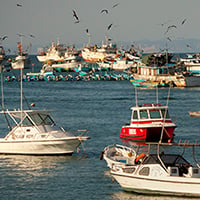Ecuador
Coastal BeachesEcuador is a country straddling the equator on South America’s west coast. Its diverse landscape encompasses the Amazon jungle, Andean highlands, and the wildlife-rich Galápagos Islands. In the high-altitude capital, Quito, which is known for its largely intact Spanish colonial center, the city is flanked by the active Pichincha volcano. The country's cultural fabric is vibrant and is heavily influenced by a mix of indigenous traditions and Spanish colonial history, which is evident in the architecture, music, and festivals. Ecuador's economy is largely dependent on commodities like oil, bananas, and shrimp. Tourism also plays a significant role, with visitors drawn to its ecological diversity, historical sites, and natural beauty. The country offers a range of experiences from the surf towns on the Pacific coast to the serene landscapes in the Valley of Longevity. Ecuador is known for its rich biodiversity, hosting a large portion of the world's species, and is one of the seventeen megadiverse countries in the world. The Galápagos Islands, far off the coast, are particularly famous for their unique wildlife and were the inspiration for Charles Darwin's theory of evolution. Despite its small size, Ecuador is home to many indigenous groups, each with their own distinct languages and customs. The country's cuisine is as diverse as its geography, with each region offering its own specialties. Ecuadorians are known for their warm hospitality and pride in their cultural heritage. The nation's infrastructure has seen significant improvements in recent years, with investments in roads, airports, and public services. However, Ecuador faces challenges such as political instability, economic volatility, and environmental concerns due to deforestation and oil extraction. Despite these issues, Ecuador remains a country of incredible beauty and resilience, with a population that is resourceful and proud of their rich cultural tapestry.
















